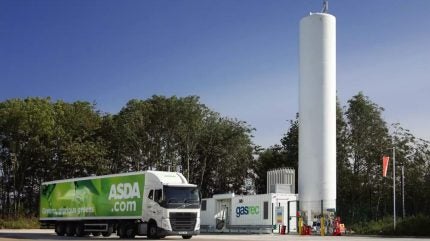
UK supermarket chain Asda has confirmed its investment in two new bio-liquefied natural gas (LNG) refuelling facilities – a significant step in the retailer’s journey to reduce carbon emissions.
The new stations, located in Warrington and Dartford, were developed in partnership with Gasrec, a company supplying fuel to commercial vehicles in the UK.
The new additions take Asda’s fully operational Bio-LNG stations to 13.
Asda maintains one of the largest fleets of LNG-fuelled trucks in the country, with more than 780 vehicles.
The new stations align with Asda’s goal of achieving net zero operations by 2040.
According to the retailer’s annual environmental, social and governance report, it achieved a 41% reduction in operational carbon emissions since 2015, with a goal to cut emissions by 50% by 2025.
Asda central fleet operation manager John Rogerson said: “LNG trucks are currently the leading alternative fuel option for operators like ourselves and with over 780 LNG vehicles, we operate the largest fleet of LNG fuelled trucks in the UK.
“Our continued investment in a UK-wide LNG distribution network forms an essential part of our objective to reduce overall carbon emissions across our operations, and towards building a sustainable business for the future.”
In addition to the Bio-LNG stations, Asda has introduced a sustainability-linked enhancement to its supply chain finance scheme in partnership with HSBC UK, set to launch in January 2025.
This initiative aims to incentivise better sustainability practices within its supply chain.
In July 2024, Asda reported a 7% reduction in its carbon emissions (scopes one to three) compared to 2022, bringing the retailer’s total reduction to 15% since 2020.
Other retailers in the UK and elsewhere have been investing in clean energy refuelling stations, as part of efforts to reduce dependency on diesel to power grocery delivery trucks.
SPAR Ireland’s independent retailers, Liam and Donal Fitzpatrick, have opened a bio compressed natural gas (BioCNG) refuelling station at SPAR Junction 14.
The station will use local food and farm waste to offer biomethane produced in Kildare by Green Generation.
BioCNG reduces harmful emissions from HGVs by offering a cleaner alternative to diesel.
Liam Fitzpatrick said: “We are delighted that Junction 14 is the first BioCNG station on the M7, providing renewable biogas produced by recycling agricultural and food waste here in our home county.
“Having opened this facility 13 years ago, we have seen the demand for renewable fuels growing steadily throughout this time. The addition of biogas represents another step in that commitment to utilise and offer sustainable options on Ireland’s motorway transport network.”



